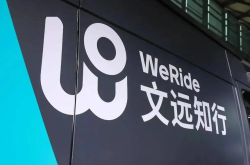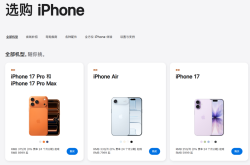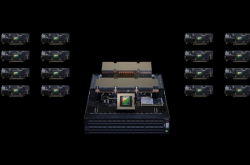"Price for volume": Doubao AI's commercial strategy in a fierce competition
![]() 10/11 2024
10/11 2024
![]() 429
429


"
By launching smart headphones based on Doubao AI, ByteDance re-enters the smart hardware market, facing challenges of high R&D and marketing costs and unclear business models. This new venture is fraught with uncertainties. ""
@TechInsights Original
No other industry has developed as rapidly as AI large models, comparable to the speed of light. In just over a year, numerous players have emerged in this field, with some already venturing into the deep waters of commercialization. As a giant in the internet industry, ByteDance would not miss this opportunity.
Since its launch in mid-May 2024, ByteDance's Doubao AI large model, though a latecomer, has been active and ambitious. Apart from providing AI technology to numerous enterprise customers, ByteDance has also introduced two heavyweight large models - Doubao Video Generation - PixelDance and Doubao Video Generation - Seaweed. On October 10, ByteDance made another big move by releasing the Ola Friend smart earbuds based on Doubao, priced at a hefty RMB 1,199.

Source: Ola Friend Live Stream Screenshot
With its rapid pace, ByteDance's ambition to create a new smart ecosystem leveraging the Doubao AI large model is evident. However, can Doubao, priced significantly lower than its competitors, carve out a niche in the crowded AI large model market through its "low-price strategy" and emerge victorious as a latecomer? With room for improvement in Doubao's technology, products, and user experience, and numerous unresolved challenges in its commercialization path, the answer is not so straightforward.
01.
"Price War" to Boost Volume

In mid-May 2024, ByteDance officially launched the Doubao large model, a full year later than competitors like Baidu and Ali Group, but its growth rate has been astonishing.
According to Volcano Engine, as of September, the daily average token usage of the Doubao language model exceeded 1.3 trillion, a tenfold increase from its initial launch in May. The daily multi-modal data processing volume also reached 50 million images and 850,000 hours of speech.
The applications of the Doubao large model are mainly divided into providing large model technology services to B-end enterprises and AI smart assistant services to C-end users. Its development path follows a B-to-C approach.
In the initial B-end market, Doubao was originally used internally within ByteDance, under the name "Lark," and was one of the first large models in China to pass algorithm registration. Before its public release, ByteDance built several AI creation tools based on the Doubao large model and integrated it into over 50 businesses, including Douyin, Tomato Novels, Feishu, and Jumei Engine, to enhance efficiency and optimize product experiences.
The Doubao large model entered the B-end market with a "price war" strategy. According to Volcano Engine President Tan Dai, "The pricing for the main model in the enterprise market is only RMB 0.0008 per thousand tokens, which costs just 0.8 cents to process over 1,500 Chinese characters, 99.3% cheaper than the industry average."
However, a price war can be a double-edged sword. On the positive side, as Tan Dai noted, "Large usage volumes refine better models and significantly reduce the unit cost of model inference." Pricing for volume can accelerate product iterations and compete with industry leaders in scale. On the negative side, competition in the B2B large model market is fierce, requiring not only price competitiveness but also technological, functional, and experiential excellence. Therefore, its application value and practicality are of utmost concern to the market.
The technological quality, functionality, and user experience of Doubao can be glimpsed through its C-end offering, the Doubao AI Smart Tool (Doubao APP). Reality shows that it is not flawless.
Some netizens have tested and reported that while Doubao's AI conversation function is impressive in terms of tone and nuance, it is not notably superior to other products. During the National Day holiday, an evaluation article titled "Work Suspended, Can AI Tour Guides Really Cover Your Basic Needs?" by Pacific Tech compared Kimi, ByteDance's Doubao, Baidu's Wenxiaoyan, and Tencent's Yuanbao, tasking the AI models to generate a travel plan based on the same requirements.
The results showed that Doubao took longer to process compared to other generative AI products, experiencing a brief "hiccup" after about 5 seconds of deliberation before providing an answer. In the final scoring based on travel logic, content richness, and other aspects, Tencent's Yuanbao and Baidu's Wenxiaoyan received 90 and 95 points, respectively, while Kimi scored 75 points. ByteDance's Doubao scored the lowest at 65 points.
It is evident that despite its reputation, Doubao's level of intelligence still needs improvement compared to other AI large model products.
Notably, after its launch, Doubao was not only free for C-end users but also quickly dominated the app market through aggressive spending. According to Seven-Mac rankings, ByteDance's Doubao APP, based on the Doubao large model, soared from 112th in the free app rankings on May 5 to the top 10 within just 6 days and reached the top spot in the overall free app rankings on June 11.
According to TechPlanet, insiders revealed that Doubao spent up to RMB 600,000 per day on advertising on Douyin alone during peak periods. AppGrowing data showed that Doubao's advertising expenditure reached RMB 140 million in June, equivalent to RMB 4.67 million daily, exceeding Kimi's half-year advertising budget.
However, aggressive spending on C-end marketing is also a double-edged sword for Doubao. The current free service model for C-end users, coupled with significant marketing investments, may lead to meager profits for ByteDance's AI large model business. In the long run, the overall input-output ratio of the Doubao large model will continue to be under pressure.
Moreover, the user retention rate from Doubao's massive advertising is not high. QuestMobile data shows that the average monthly usage days for mainstream AIGC apps are generally below 5 days (only Xingye reaches 7.7 days), resulting in an active rate generally below 15%.
It is evident that the true value of the C-end users acquired by ByteDance at a significant cost is difficult to assess. However, it is clear that this is not a "cost-effective" venture before C-end commercialization.
AI commercialization has always been a challenge in the industry. In this competitive and challenging sector, whether ByteDance can achieve its ambitions in the AI large model market through "strategic losses" with Doubao remains uncertain.
02.
Commercialization Alarm Sounded

Clearly, Doubao's future challenges lie primarily in commercialization. Specifically, it may face significant difficulties in both B2B and B2C markets.
In the B2B market, B-end enterprises have long paid for AI technology, and market awareness is mature with a viable business model. After all, before its official release, Doubao had already been applied in many ByteDance products, and its model capabilities have been thoroughly tested. This is ByteDance's advantage in deploying large models.
Moreover, the number of Doubao's B2B customers has been steadily increasing, and its business ecosystem is continually improving. For instance, Honor and OPPO have announced cooperation with Doubao in smart terminals, while in the smart car alliance, Doubao has forged deep partnerships with Geely, Great Wall, NIO, and GAC Motor, among others.
However, compared to companies like Ali Group and Baidu, which began commercialization earlier, Doubao's B2B market share is relatively insignificant. Additionally, there is still a gap in the breadth and depth of its cooperation compared to Baidu's Wenxin large model and Ali Group's Tongyi Qianwen's diversified B2B services.
Taking Baidu's Wenxin Intelligence Platform as an example, it announced in August that since the release of Wenxin Large Model 4.0 in October 2023, it has gathered over 600,000 developers and over 100,000 partner enterprises, supporting a vast array of callable tools to build an inclusive business pathway for developers and efficiently achieve operational closure.
It is worth noting that Doubao's initial "price war" strategy may not be a panacea for capturing market share.
In fact, as Doubao lowered its prices to "rock bottom," other large model vendors began to follow suit. For instance, Alibaba's Tongyi Qianwen large model products have undergone several price reductions, some of which were astonishing.
At the Alibaba Cloud Computing Conference 2024, held on September 19, three main Tongyi Qianwen models on the Alibaba Cloud Bailian Platform underwent further price reductions, with some products seeing price cuts exceeding 80%. As ByteDance's B2B customer base grows, the pressure on profitability will become increasingly apparent.
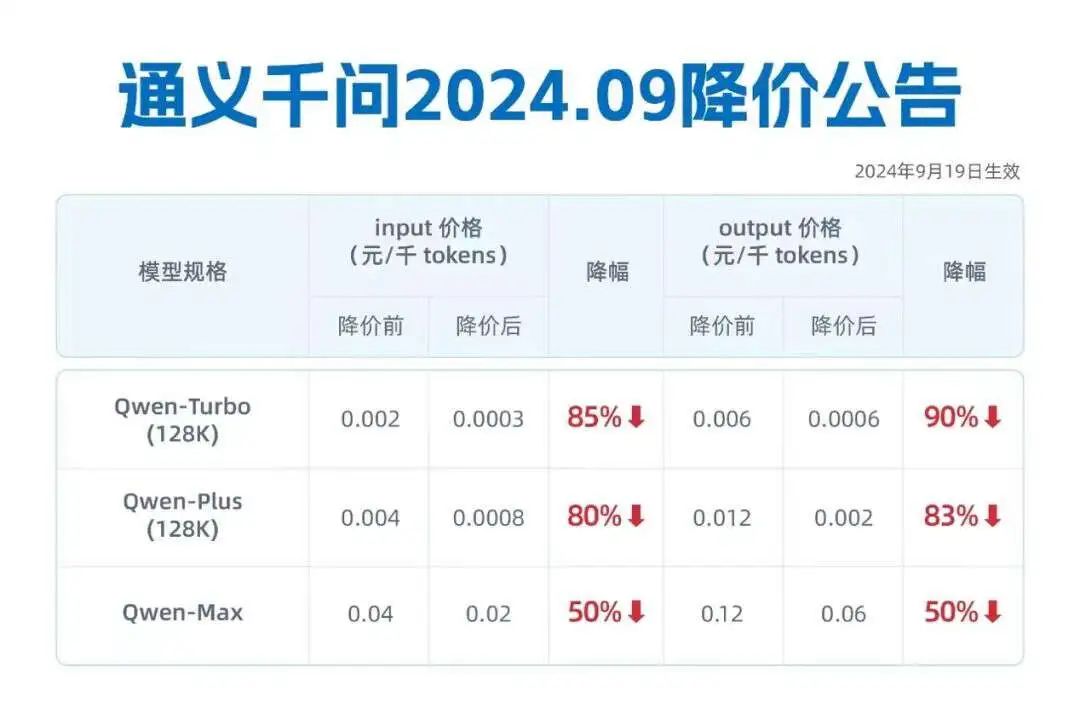
Source: Alibaba Official Weibo
On the C-end side, Doubao, which currently focuses on a free model, has surpassed competitors like Baidu in user scale through aggressive marketing. However, given the generally weak willingness and unestablished habit of C-end users to pay, Doubao still needs to further "nurture" the market. The commercialization challenges it faces in the C-end market are self-evident.
This can be seen by comparing Baidu, which is currently leading in commercialization. According to previous Sensor Tower statistics, as the first AI assistant in China to offer paid subscription services, Baidu's Wenxin Yiyan (now renamed Wenxiaoyan) generated less than USD 500,000 in in-app purchases and subscriptions within its first year of operation.
It is evident that ByteDance's future commercialization in the C-end market may not be a smooth ride.
Objectively speaking, Doubao, like other large model industry players, faces computational power, algorithm, and data challenges in technological research and development and product upgrades. As iResearch CEO Zhang Yi believes, high-quality language data is the foundation for training large models, and the availability of sufficient high-quality datasets may affect model performance and generalization ability.
Furthermore, with the full launch of voice AI represented by iFLYTEK and GPT-4's advanced speech capabilities, many brands are vying for a share in other model capabilities. This highlights the shortcomings of Doubao's large model, which currently focuses primarily on text and video content generation.
In response, ByteDance stated, "In the future, we need to continue investing in overcoming various technical challenges in our models, such as hallucinations and long texts, to continuously enhance model capabilities."
03.
Re-entering the Smart Hardware Race
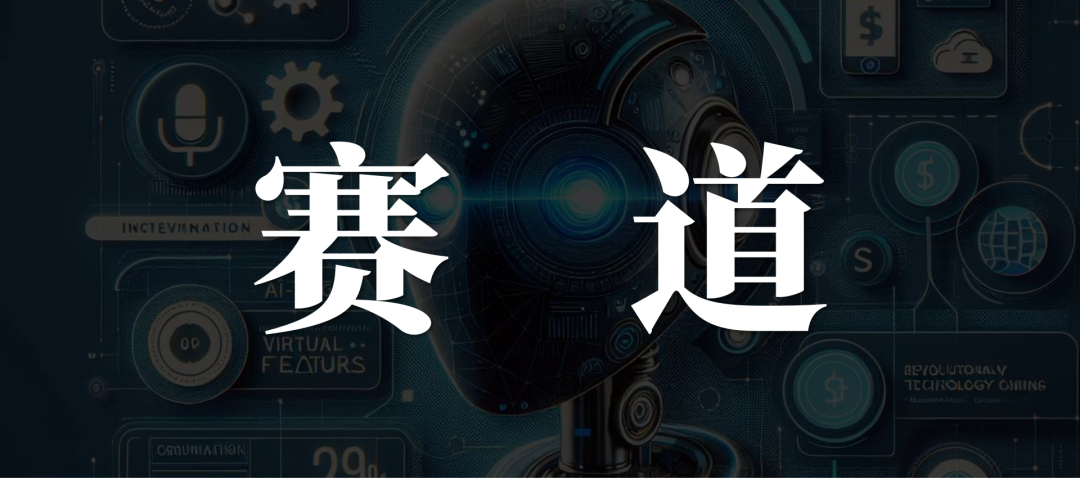
Apart from opening up applications for B-end and C-end users, Doubao has also ventured into the hardware market by launching the Ola Friend smart hardware product. On October 10, after a period of preheat , the Ola Friend smart earbuds, the second-generation product, were officially launched online.
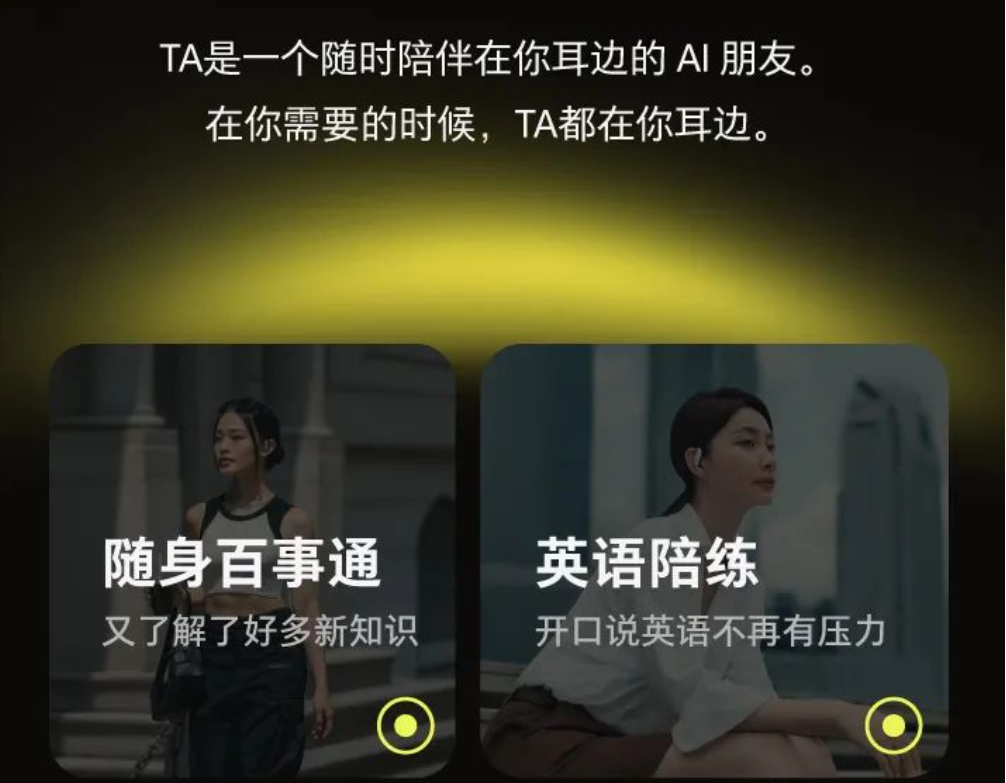
Source: Doubao Official WeChat Account
The earbuds are equipped with the Doubao large model and integrated with ByteDance's conversational AI app, Doubao App. Upon wearing the smart earbuds, users can access Doubao through voice commands and control the earbuds via the Doubao App. According to the official introduction, the earbuds offer services such as a personal assistant and English language practice.
Moreover, ITBEAR reported that ByteDance's AI hardware team is actively promoting cooperation between the Doubao large model and smart assistants from other smartphone manufacturers to leverage the model's capabilities in broader scenarios.
Additionally, there have been rumors that ByteDance is planning to enter the smart glasses market. The company may accelerate the development of smart glasses through investments in emerging companies or the establishment of an internal team. These signals indicate ByteDance's ambition to break into the smart hardware market through various means.
While ByteDance has the Doubao AI large model as its foundation, expanding into the hardware sector and improving its scenario ecosystem seems like a natural progression. However, the development and production of smart hardware are likely not as straightforward as software, and the challenges ByteDance will face in the future are foreseeable.
On the one hand, ByteDance's past forays into smart hardware have not been particularly successful, with a history of repeated failures.
For instance, starting in 2020, ByteDance focused on the education hardware market, launching the "Diligent Education" brand and releasing products such as smart study lamps, educational tablets, and electronic dictionaries. However, its flagship product, the Diligent Smart Lamp, performed modestly in the market and was impacted by the "Double Reduction" policy, leading to rumors of layoffs.
At the same time, due to the overly commercial nature of its smart products, parents have criticized them for exaggerated claims and perceived as a "tax on intelligence," leading to continuous doubts about the products.
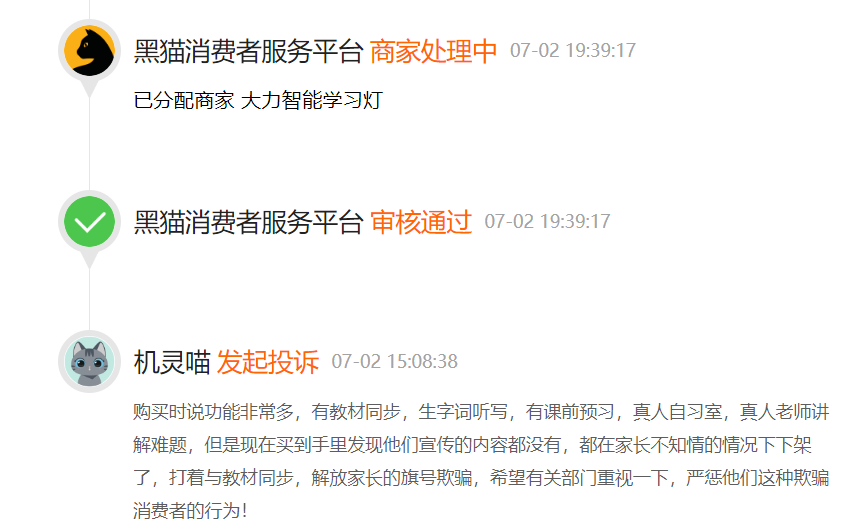
Source: Heimao Complaints
Similarly, in 2021, ByteDance invested 9 billion yuan to acquire PICO, the top domestic VR vendor by shipments, and invested tens of billions of yuan in R&D, marketing, and operations. In 2023, rumors of layoffs at PICO surfaced multiple times, to which the company officially responded positively.
In fact, before Doubao's large model entered the market personally, it had already collaborated with many hardware vendors. At the 2024 Spring Volcano Engine FORCE Conference in May, it showcased three AI hardware-integrated products: a robot dog, a learning machine, and a learning robot.
On the other hand, in a horizontal comparison, only smart speakers and smartwatches currently stand out among smart hardware products. Even when integrated with AI concepts, their application scenarios remain limited.
Moreover, the former category, including products like Baidu Xiaodu and Tmall Genie, has already captured a significant portion of the market. The latter, however, has frequently faced skepticism due to immaturity in related technologies. For instance, since 2024, products from brands like 360, vivo, and Xiaotiancai have been questioned by consumers for their watches' AI responses that are deemed "unintelligent" or even "nonsensical.""When Doubao's large model enters the earphone market, it remains uncertain whether it can avoid industry competition and stand out in market feedback. After all, from a competitive perspective, these sectors are filled with players equipped with both software and hardware capabilities, and there are countless brands.
Therefore, despite ByteDance's repeated failures, its renewed bet on the smart hardware sector through Doubao AI is akin to being late to the game. Judging from the application scenarios, products, and future potential of AI large models, its development in the smart hardware sector is likely to encounter challenges and obstacles.
ByteDance is a massive company. Besides the well-known products like Douyin and Xiguavideo, previously behind-the-scenes products like Feishu and Doubao are gradually stepping into the spotlight, further strengthening ByteDance's foundation.
However, ByteDance's re-entry into the smart hardware sector will also pose practical challenges due to its strategic diversification, including excessive investments in technology, product development, and marketing costs, as well as ambiguous business models.
In this regard, ByteDance, with its ambition to "have it all," is betting on Doubao and eager to expand in the smart hardware sector, aiming for growth but also facing potential crises and uncertainties. It remains to be seen whether ByteDance can leverage its AI large model to secure another victory in this new sector.
References:
1. "ByteDance Warms Up for Smart Hardware Ola Friend, Expected to Be Smart Headphones" - IT Home
2. "Collaborating with Doubao Large Model, Skyworth Coocaa Accelerates OTT Scenario Intelligence with AI" - Dazhong Net
3. "Work Suspended, Can AI Tour Guides Really Take Care of Your Basic Needs?" - PacificTech
4. "ByteDance is Clear-Eyed About Doubao" - Data Yuan
5. "Spending Over a Hundred Million on Ads, 70% of Users Acquired through Paid Traffic: Can Large Models Afford the Cost?" - Tech Planet
6. "Aggressively Pursuing AI, How Many Cards Does ByteDance Still Have?" - Bohu Finance
7. "Monthly Active Users Surpass ERNIE Bot! ByteDance's 'Doubao' Tops China's Most Popular Large Models" - Wall Street CN
8. "Doubao Large Model Upgrade Still Needs to Further Enhance Competitiveness" - China Business News
9. "Laying Off Over 300 Employees! PICO Responds to Rumors of 80% Layoffs, Team Still Exceeds 1,000" - Zhidongxi
10. "Eliminating Boot-up Ads: A Forced Transformation for Cable TV" - Cover News




